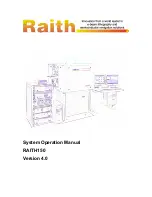
Manual 2100-034G
Page
16 of 21
Condenser Coil Cleaning
All Products – Coil Cleaning
The outdoor coil must be kept clean and free of any airborne debris, which can accumulate over time. Large
volumes of air are circulated over the coil, and airborne debris such as lint, dust, materials shed from trees, paper
or other types of airborne material that can become airborne can collect on the entering coil surface. The outdoor
coil must dissipate heat during the cooling mode and for a heat pump, also absorb heat during the heating mode.
If the coil is dirty and matted with debris, the airflow across the coil will be reduced causing poor performance,
increased operating run time and associated utility bills and in extreme conditions can shorten the useful life of the
equipment.
Depending on the specific equipment involved, the surface that can accumulate debris can be on the opposite side
that is exposed to view when standing in front of the machine. Closely review the machine when operating to see
which direction or path the airflow takes as it moves through the machine. If the air inlet side of the coil is hidden,
try to observe the back (hidden) side by looking into the side grilles, using a flashlight if necessary. While the user
of the equipment needs to be aware of the potential of clogging of the outdoor coil surface, actual cleaning of the
outdoor coil should not be attempted under most circumstances. If the user should attempt this procedure on their
own, never do so without first having the installing dealer or service company instruct you in the proper procedure
and technique.
The product installation instructions contain additional information regarding unit coil cleaning.
This information may be accessed at
www.bardhvac.com
.
WARNING: Do not open or enter the equipment without first turning off the electrical service disconnect.
Failure to do so can result in personal injury due to moving parts and/or electric shock hazard resulting in death.
Other conditions that can cause reduction of airflow across the outdoor coil are flowers, shrubbery or other growth too
near the outdoor coil air inlet and outlet openings. These living things, especially as they mature and grow, will be
just as effective in blocking the airflow and create the same problems as will stacking things against the equipment.
These conditions can be easily managed and controlled by the user, as they do not require actually entering into the
equipment enclosure, which should only be done by qualified service technicians.
Equipment Corrosion Protection
1. Avoid having any lawn sprinkler spray directly on the equipment, especially if from a brackish water source.
2. In coastal areas or corrosive environments, locate equipment as far away from the corrosion source as feasible.
Units exposed directly to salt spray should be coated by a secondary protective coating operation to reduce
corrosion on copper tubing, fasteners, motors and other metal parts. Coils should be ordered with a corrosion
protective coating. Contact Bard for coating options.
3. Frequent cleaning and waxing of the cabinet using a good automobile polish will help extend its original
appearance and protect painted surfaces.
Summary of Contents for 11EER WA Series
Page 2: ......
Page 24: ......
Page 30: ...Manual 2100 479 Page 6 of 11 FIGURE 1 TYPICAL AIR CONDITIONING SYSTEM COOLING CYCLE MIS 369...
Page 31: ...Manual 2100 479 Page 7 of 11 FIGURE 2 TYPICAL HEAT PUMP SYSTEM COOLING CYCLE MIS 368...
Page 36: ......
Page 81: ......
Page 86: ...Manual 2110 1452G Page 5 of 17 This page intentionally left blank...
Page 90: ...Manual 2110 1452G Page 9 of 17 This page intentionally left blank...
Page 99: ......
Page 102: ......
















































